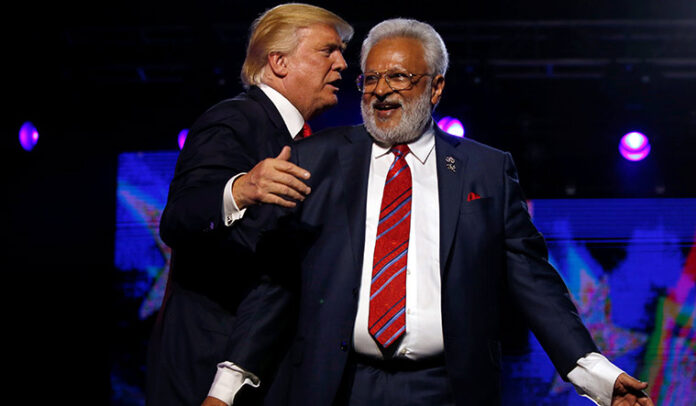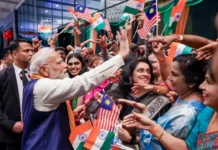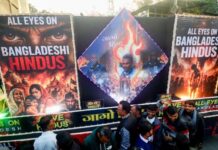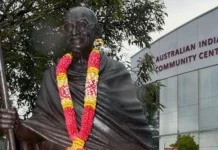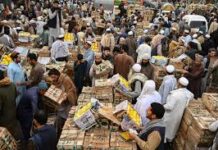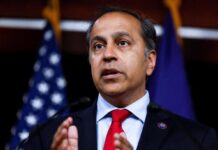WASHINGTON DC: If Donald Trump is re-elected as the US President in tomorrow’s presidential polls, he will crackdown on Khalistani separatists and even Canadian Prime Minister Justin Trudeau will listen, US Industrialist and founder of the Republican Hindu Coalition, Shalabh Shalli Kumar has said.
In an interview with ANI, Shalabh Kumar said India and US will be looking for a Free Trade Agreement (FTA).
Asked if a probable Trump presidency may resolve the Khalistani issue and the strain in the Indo-Canada relations, Kumar said “Yes, that will happen”.
“In fact, what happened after President Trump’s tweet, even Prime Minister Trudeau had to make a comment. He softened his position. Khalistanis are just a simple distraction. It’s very few people. I have tons and tons of friends from Punjab and I have tons of Sikh friends,” he said, adding that the condemn activities of Khalistani separatists.
“In the United States, it’s not going to happen under his (Donald Trump) watch. But even in Canada, Trudeau will have to listen,” he said.
Shalabh Kumar said Trump and PM Modi are good friends and the next four years “are going to be great” if Trump is re-elected.
“Kamala Harris is just Hindu by name, but her actions and policies are anti-India. She wants a free Kashmir. 5-7 people in her campaign are pro-Pakistanis. Pakistan is a bankrupt state but it is now a satellite state of China. So subsequently it is a big challenge for India and the US. China will use Pakistan as their proxy and create some trouble. But, for India and America’s relationships, we are looking forward to a Free Trade Agreement (FTA) between the two countries. (Former) President Trump and PM Modi are good friends and hence the next four years are going to be great under the presidency of Donald Trump,” he said.
The United States is poised for presidential elections on November 5 (local time) and the race for the White House is down to the wire.
Over 160 million voters are expected to cast their ballots, with the results either delivering a return to power for Republican former President Donald Trump (78) or electing America’s first woman in the White House, Vice President and Democratic candidate Kamala Harris (60).
According to polls, both candidates are deadlocked in the race, with an estimated 75 million voters having already voted. Neither candidate currently holds a polling lead in enough states to reach 270 electoral votes.
As of November 4, NBC News and Emerson College have projected a 49 per cent-49 per cent tie nationally. Ipsos has projected a three-point lead (49 per cent-46 per cent) to Harris and AtlasIntel has projected a two-point lead (50 per cent-48 per cent) to Trump.
India has been repeatedly expressing its deep concern about extremism and the culture of violence and anti-India activities in Canada and has sought action against these activities.
The ties between India and Canada have taken a sharp downturn following Canadian leaders making allegations without providing evidence about an assassination on their soil.
The sharp deterioration in ties has seen India withdrawing its High Commissioner from Canada.
India had last month Canada’s then Charge d’Affaires Stewart Wheeler and conveyed that the “baseless targeting” of the Indian High Commissioner and other diplomats and officials in Canada was completely unacceptable.
India underlined that in an atmosphere of extremism and violence, the Trudeau Government’s actions endangered their safety.”We have no faith in the current Canadian Government’s commitment to ensure their security. Therefore, the Government of India has decided to withdraw the High Commissioner and other targeted diplomats and officials,” MEA had said in a release.
The bilateral ties soured after Trudeau alleged in the Canadian Parliament last year that he has “credible allegations” of India’s hand in the killing of Khalistani terrorist Hardeep Singh Nijjar.
India has denied all the allegations, calling them “absurd” and “motivated” and has accused Canada of giving space to extremist and anti-India elements in their country.
Nijjar, who was designated a terrorist by India’s National Investigation Agency, was shot and killed outside a Gurdwara in Surrey in June last year.
Trudeau had also said last month that his government had not provided India with hard evidence but just intelligence regarding the killing of Nijjar on Canadian soil.
Testifying at Canada’s foreign interference inquiry, Trudeau said India has been insisting on evidence over allegations levelled by Canada.
“Behind the scenes (were trying) India to co-operate with us. Their ask was…give us the evidence you have on us. Our response was it is within your security agency. You should be looking into how much they know, you should be engaging… ‘No, no but show us the evidence’. At that point, it was primarily intelligence, not hard evidentiary proof. So we said let’s work together…,” he said. (ANI)
Also Read: US: Donald Trump escalates race attacks on Kamala Harris’ Indian heritage

